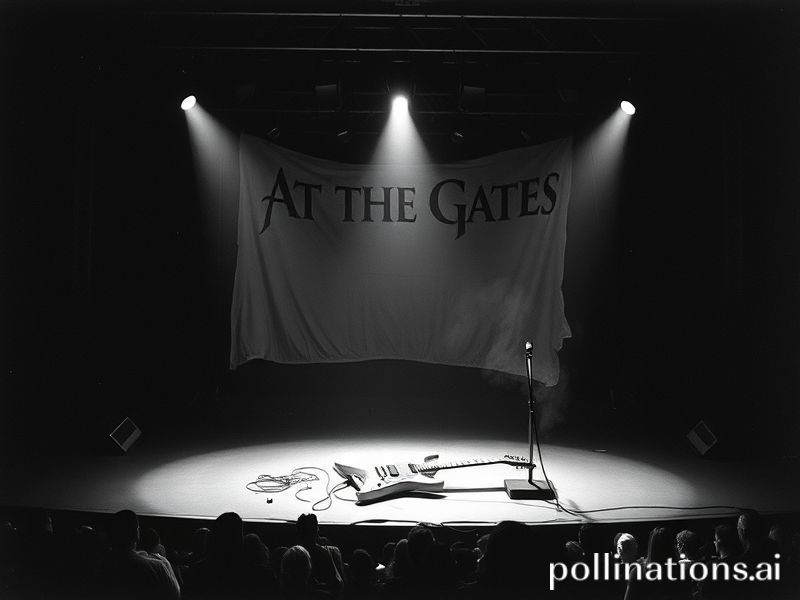Global Grief, Blast-Beats & Unverified Extinction: The Tomas Lindberg Death Rattle Heard ‘Round the World
Tomas Lindberg, the Swedish death-metal vocalist whose shriek once frightened livestock from Malmö to Milwaukee, is reportedly no longer among the quick. News of his demise ricocheted through the global underground faster than a blast-beat at 280 bpm, prompting sincere eulogies, suspicious memes, and at least three hastily printed T-shirts already for sale in Jakarta. While official confirmation remains as elusive as a polite moshpit, the international ripple tells us something deliciously grim about the planet’s current emotional temperature.
Start in Tokyo, where salarymen on the midnight Yamanote Line queued Spotify’s “Slaughter of the Soul” like it was the new national anthem. Over in Buenos Aires, a collective groan rose from the city’s anarchist bookshops—apparently nothing punctures revolutionary zeal quite like learning your sonic patron saint has checked out. Meanwhile, Berlin club kids held a 4 a.m. moment of silence, which lasted exactly seventeen seconds before someone dropped a remix titled “Lindberg’s Last Scream” and the Berghain resumed its regularly scheduled existential twerk. Across these disparate scenes, one theme emerged: if the guy who literally wrote the soundtrack to civilization’s decline can die, what hope remains for the rest of us?
The economic implications are, naturally, absurd. Cryptocurrency forums lit up with proposals for a $ATGATES-style commemorative token (“LINDG” on the Ethereum chain), promising holders “eternal brutality” and a 7 % APY—because nothing says punk like yield farming. Global streaming platforms rushed to add “curated grief playlists,” each algorithmically guaranteed to pair nicely with artisanal grief-lattes. Even the London Metal Exchange—an institution that usually traffics in nickel futures rather than neck-tattoo futures—reported a minor spike in Scandinavian cultural derivatives. Somewhere, a hedge-fund intern in Connecticut is being yelled at for failing to foresee the posthumous merch bump.
Diplomatically, Sweden dispatched a junior culture attaché to clarify that Lindberg’s death is still “unverified” but noted, with Nordic dryness, that the country’s soft-power reserves now rival ABBA’s back catalogue. The Russian foreign ministry issued a statement blaming NATO expansion; the U.S. State Department issued a statement blaming Russia for blaming NATO; and the Chinese censors simply muted anything containing the word “death,” which inadvertently boosted VPN sales. Multilateralism at its finest.
Of course, the broader significance lies in what we choose to mourn. As oceans acidify and democracies autotune themselves into oblivion, the planet pauses for a singer whose greatest hit promised to “drink the blood of the innocents.” It’s a touching reminder that humanity’s coping mechanism remains the same: crank the volume high enough to drown out the geopolitical tinnitus. Lindberg’s alleged exit offers a convenient vessel for our collective dread—far easier to scream along to Swedish d-beat than to, say, read the latest IPCC report.
And yet, there is something heartening in the spectacle. From Lagos grindcore WhatsApp groups to Siberian punk squats, strangers are sharing bootlegs and memories, united in the belief that noise can still constitute community. The joke, perhaps, is that it takes a rumored death to make the living briefly acknowledge one another. We’ll all go back to doom-scrolling tomorrow, but for one gloriously distorted evening, the planet felt like one big, badly lit basement show—sticky floors, warm beer, and the faint possibility that catharsis still ships internationally.
So pour one out for Tomas, whether he’s actually departed or just hiding in a Gothenburg studio laughing at us. Either scenario fits the genre. After all, death-metal has always been less about dying than about reminding the living that we’re next. Cheers to that, and mind the blast beats on your way out.







